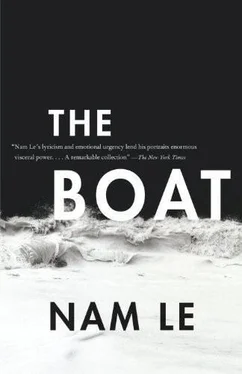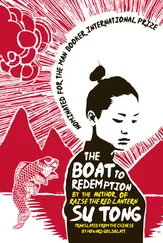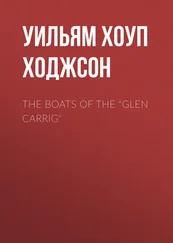I'm not sure I'm ready . What did she mean? Ready for what? To see me? Or for the concert? I shouldn't have pestered her hours before her big performance. But did that mean she'd be ready after the concert, though? Maybe she meant she wasn't ready for marriage to the Leech. A coded message. I shamble under the elms, past the hackberries and maples, lindens and ashes, deep in thought. When we came here Olivia had always insisted on teaching me the names of things. By the pond a group of amateur photographers click away at the asters. I decide to go the long way, double back later. I shuffle painfully through the crowd. Then, at the line of horse-drawn carriages, I stop, my body burning, let myself think it. She wasn't ready to see me at all. Maybe she 'd never be ready.
I don't realize until I'm a little ways down Fifth. It's the height of fall. I turn around. Central Park is in bloom, spastic with color — red, orange, green, yellow, purple, brown, gold. The asters have broken out into their annual parade of white, lavender, red, and pink. My head knows this but my eyes missed it — my poor eyes didn't see it.
I hang my head, trudge west along Fifty-seventh. Finally I get to Carnegie Hall. Focus , I tell myself. I convince the man at the box office that I'm Elise Kozlov's father. This makes me feel grubby and proud at once. Of course it's important, I tell him. He tells me where they're rehearsing, doing sound checks or something. I follow the sound to the parquet entrance of the main auditorium, push the door open and see her immediately, the black-gray smudge of four smudges on the distant stage, the one with the instrument between her legs. The one made small by her instrument. I move closer. She's just a girl in a dress that barely covers her knees. She looks like the girl in the website photo. Her face under the heavy lighting so young, yet so stern. Even the way she holds the cello is stern. I see it all clearly now.
And she's beautiful without me. I hate the young for that too. That they're assured in their beauty, in the way that only animals are assured — unmussed by the thought of death.
At the end of the piece she looks up and sees me. I'm in the half dark nearly a hundred yards away but she looks straight at me. No startlement, no gasp, no hand-to-mouth dramatics. It's me who's too stunned to do anything. Looking directly at me, she says something — her lips move — and I try desperately to decipher her words, to puzzle out a fitting response. By that point a young man in jeans and a black T-shirt glides out of the wings and down the aisle. Without touching me once, he escorts me outside the auditorium.
"Are you Sharps?"
He shakes his head. Then he looks up at me curiously. "Hey, sir, are you all right?" "Tell her I want to see her. Just for a second."
"Sorry?"
"Elise. Tell Elise — her father's here to see her." Her lips in my head, the lines of them, merging into one another. Her eyes.
"Tell her… he says he's sorry."
"Wait here." As soon as he leaves, I slip back into the auditorium. Stand in the shadows. Then I see them onstage. The Leech attaching himself. He's a gangly, womanly-shouldered redhead. She's kissing him, her face upturned. I resent the grace of it, and the want. She's on tiptoes and both her arms are lifted up to his ears. He doesn't stoop at all to meet her lips. I feel my stomach in my throat, breath hot and thick through my nostrils. Apelman's voice in my head like an advertising jingle. I creak the heavy door open and slink back outside.
Minutes later the door opens again and Black T-shirt hands me a note. His face is insouciant now, verging on rude. By this time I don't care. My heart is hopping. I was wrong. I remembered — she looked straight at me . She wants to see me, she knows it's inevitable. I wait until he's gone before I unfold the note:
Henry,
I don't want to see you. Please meet Jason backstage after the concert (show this note) to discuss a payment plan for the Guadagnini.
***
FIRST, DRAW A BATH. Outside, light thinning into the color of piss. Everything looks like the color of piss. Peel off my jacket, shirt, pants, throw them into a corner where they squat, stiffened from starch and sweat, malevolent. Lidocaine my bloated, inflamed rosebud. Lower it — aaaaarggh — into the steaming hot bath. Then something I haven't done for almost a year: try to sketch. My fingers jiggling. I keep them out of the water, clinching a stick of charcoal, meek above the wet-splotched pad.
Apelman doesn't know I haven't done this at all since Olivia died. Sketched or painted. He doesn't know, either, that I've been seeing her everywhere. Today, though, I saw my daughter. And she saw me. Maybe for the last time. Why am I drawing? Apelman would love the idea: painter turns to art to redeem suffering. Sometimes, if the hand moves, the mind can rest. But not this time. I'm drawing to grab hold of her. If the hurt's all I have left of her, I want to keep it, keep it alive — hurting — because right now I think I need everything I have.
It was her handwriting. Unchanged in four years. She called me by my name.
It starts drizzling outside. The room darkens. Water condenses and runs down the full length of the windows, spills over the curved limestone caps. There's an exhaustion in the quality of the light. On the street, leaves catch moisture, gleam like the scales of dead fish. The gutters go black and wet.
A dot. Another dot. A line between them. I remember the last face I drew. Believe it or not, she, Olivia, was the only one. My single dalliance — through five years of matrimonial, blue-balled freeze-out. She was my risk. When my wife found out about her and blew the country, dangling our daughter from her broom, Olivia told me, "You've made your choice. Don't keep on choosing. Not every day you're with me."
Young women fuck like they're running out of time. It's like they know something. When her time ran out, I sat there, weeks, sketching her. Wondering if she could hear me, sense me, through her coma; if, when she slept, she completed a thought with each breath. An old man and a beautiful, serious young girl. I wondered how long she'd known about the diagnosis. I wondered whether — if I'd known — it would have made a difference. But all I had known was her perfect hunger, the painful playing out of her imperfect satisfaction.
At the hospice, I frightened away her visitors: mostly young people holding tight-bunched, crinkle-wrapped flowers, fuzzy toys, heart-shaped balloons. They came with nothing to say, stretching their lips as though smiling to me. They leaned over her machine-lived body with their face piercings and earplugs and iPods and cell phones and I wanted to rip all their things off, throw them away, and show them — show them — if they wanted so badly to plug the sockets of their bodies-what it was to be fixed upon that bed.
Only Apelman stayed, sitting by me as they pumped cocktail after cocktail into her polluted veins, her self-savaging body, watching me as I watched her…
The drizzle turns to rain. Outside the glass wall, the last of the color is sucked out of the air. The streets are filthy with debris and the wind picks up papers, plastic wrappers, dead leaves — tosses them on its invisible surf. Holding my hands up, I immerse my head in the bathwater. Suddenly the plumbing of the whole building comes alive, like the massive groaning of the earth itself. I can hear the rain drumming on every exposed surface. Olivia taught me that trick.
I sit up, look out through the glass. I like the rain, how it makes monochrome of things. Even its own noise. People pass by, faces darkened under black umbrellas. Feet mutely slapping shallow puddles. Some caught unprepared: rushing arms crossed, heads bowed, as though shouldering their way out of an emergency room. Others slow down, look up, faces spotted with raindrops, mouths agape, pretending they're actually enjoying it. Chumps.
Читать дальше











